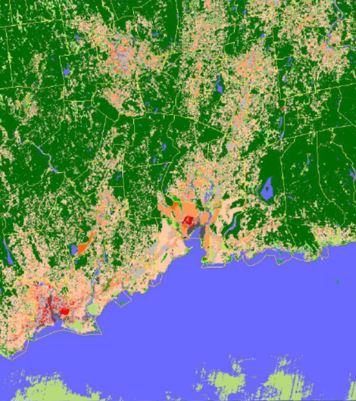Project Description
Extreme heat and cold are among the leading causes of climate vulnerability in the United States due to potential impacts on human health and well-being. In particular, residents in Connecticut are less acclimatized to the heat, which could signify a higher risk for heat-related diseases during extreme weather events. The occurrence of heat islands due to urbanization produces relatively warmer air temperatures near the ground, which makes urban and sub-urban areas warmer in comparison to rural areas. This project aims to identify variations in air and surface temperature over time and their linkages to land cover and land-use changes. The outcomes of this project are critical to support local decision-makers in determining the thermal vulnerability of local communities in the Resilient Connecticut project. The project will encompass the state of Connecticut with an emphasis in New Haven and Fairfield County areas.
Project Timeline: May 2019 - June 2021
Project Outcomes
The main objective of this study will be to map and identify vulnerable areas to heat and cold, extreme climate conditions and identify the contribution of the changes in heat to vulnerability. The data will be used to model the differences between street and satellite measured temperatures and heat vulnerability in the area. The technical report and maps will be posted to this site as they become available.
UConn Today Feature Article:
- CIRCA Webinar Presents Changes to Land Surface Temperature, Land Use in New Haven, Fairfield Counties 'Heat islands' in urban areas have experienced a five-to-10-degree temperature increase over the past 20 years
CT Post Article
- Some CT communities are getting hotter - faster, study shows by Jordan Fenster
Project Fact Sheet
Webinar
Original air date June 21, 2021 – View slides and a recording HERE
FINAL Report Download
 Loading...
Loading...
 Loading...
Loading...

Researcher
Mariana Fragomeni, Asst. Professor, University of Connecticut Department of Plant Science and Landscape Architecture
Tracey Miller, PhD student, University of Connecticut Department of Plant Science and Landscape Architecture